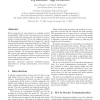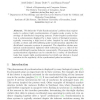60 search results - page 1 / 12 » Self-stabilizing byzantine agreement |
137
click to vote
OPODIS
2003
15 years 3 months ago
2003
Awareness of the need for robustness in distributed systems increases as distributed systems become an integral part of day-to-day systems. Tolerating Byzantine faults and possessi...
135
click to vote
INFOCOM
2011
IEEE
14 years 5 months ago
2011
IEEE
—We consider the problem of maximizing the throughput of Byzantine agreement, when communication links have finite capacity. Byzantine agreement is a classical problem in distri...
159
Voted
ICDCN
2011
Springer
14 years 5 months ago
2011
Springer
We address the problem of designing distributed algorithms for large scale networks that are robust to Byzantine faults. We consider a message passing, full information model: the ...
121
Voted
IJNSEC
2010
14 years 8 months ago
2010
Secure networks rely upon players to maintain security and reliability. However not every player can be assumed to have total loyalty and one must use methods to uncover traitors ...
CORR
2008
Springer
15 years 1 months ago
2008
Springer
We define the "Pulse Synchronization" problem that requires nodes to achieve tight synchronization of regular pulse events, in the settings of distributed computing syste...



